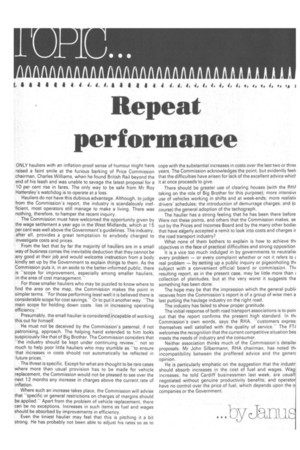Repeat performance
Page 60

If you've noticed an error in this article please click here to report it so we can fix it.
ONLY hauliers with an inflation-proof sense of humour might havet raised a faint smile at the furious barking of Price Commission chairman, Charles Williams, when he found British Rail beyond the end of his leash and was unable to savage the latest proposal for a 10 per cent rise in fares. The only way to be safe from Mr Roy Hattersley's watchdog is to operate at a loss.
Hauliers do not have this dubious advantage. Although, to judge from the Commission's report, the industry is scandalously inefficient, most operators still manage to make a living. There was nothing, therefore, to hamper the recent inquiry.
The Commission must have welcomed the opportunity given by the wage settlement a year ago in the West Midlands, which at 1 5 per cent was well above the Government's guidelines, The industry, after all, provides a great temptation to anybody charged to investigate costs and prices.
From the fact that by far the majority of hauliers are in a small way of business comes the inevitable deduction that they cannot be any good at their job and would welcome instruction from a body kindly set up by the Government to explain things to them. As the Commission puts it, in an aside to the better-informed public, there is "scope for improvement, especially among smaller hauliers, in the area of cost management."
For those smaller hauliers who may be puzzled to know where to find the area on the map, the Commission makes the point in simpler terms. "For those performing least well it is believed there is considerable scope for cost savings." Or to put it another way. "The main scope for holding down costs lies in increasing operating efficiency."
Presumably, the small haulier is considered incapable of working this out for himself.
He must not be deceived by the Commission's paternal, if not patronising, approach. The helping hand extended to him looks suspiciously like that of Big Brother. The Commission considers that "the industry should be kept under continuing review," not so much to help poor little hauliers who may stumble as "to ensure that increases in costs should not automatically be reflected in future prices."
The threat is specific. Except for what are thought to be rare cases where more than usual provision has to be made for vehicle replacement, the Commission would not be pleased to see over the next 12 months any increase in charges above the current rate of inflation.
Where such an increase takes place, the Commission will advise that "specific or general restrictions on charges of margins should be applied." Apart from the problem of vehicle replacement, there can be no exceptions. Increases in such items as fuel and wages should be absorbed by improvements in efficiency. Even the tiniest haulier may feel that this is pitching it a bit strong. He has probably not been able to adjust his rates so as to
cope with the substantial increases in costs over the last two or thret years. The Commission acknowledges the point, but evidently feel( that the difficulties have arisen for lack of the excellent advice whiclit at once proceeds to give.
There should be greater use of clearing houses (with the RI-U taking on the role of Big Brother for this purpose); more intensiv( use of vehicles working in shifts and at week-ends; more realist( drivers' schedules; the introduction of demurrage charges; and (o course) the general adoption of the tachograph.
The haulier has a strong feeling that he has been there before Were not these points, and others that the Commission makes, se out by the Prices and Incomes Board and by the many other bodiei that have eagerly accepted a remit to look into costs and charges ir the road transport industry?
What none of them bothers to explain is how to achieve th( objectives in the face of practical difficulties and strong opposition
It is a vice too much indulged in by governments to neutralisi every problem — or every complaint whether Or not it refers to real problem — by setting up a public inquiry or pigeonholing thi subject with a convenient official board or commission. Thi resulting report, as in the present case, may be little more than collection of platitudes, but at the very worst it suggests tha something has been done.
The hope may be that the impression which the general publii receives from the Commission's report is of a group of wise men a last putting the haulage industry on the right road.
The industry has failed to show proper gratitude.
The initial response of both road transport associations is to poin out that the report confirms the present high standard. In thi Commission's own words, says the RNA, -customers expres' themselves well satisfied with the quality of service." The FT) welcomes the recognition that the current competitive situation bes meets the needs of industry and the consumer.
Neither association thinks much of the Commission's detailei proposals. Mr John Silbermann, RHA chairman, has noted thl incompatibility between the proffered advice and the generE opinion.
He is particularly emphatic on the suggestion that the inclustr should absorb increases in the cost of fuel and wages. Wag increases, he told Cardiff businessmen last week, are usuall negotiated without genuine productivity benefits; and operator have no control over the price of fuel, which depends upon the o companies or the Government.
. by Jaal_






























































































































